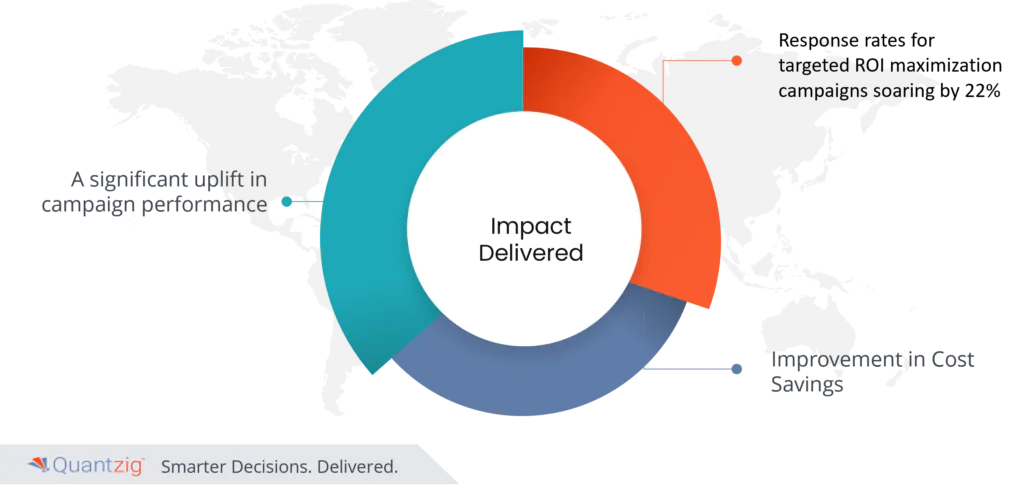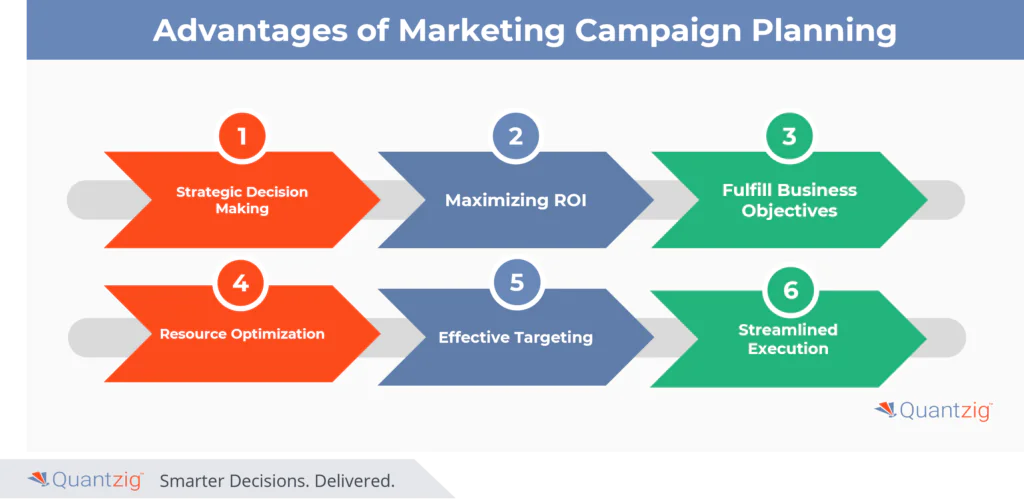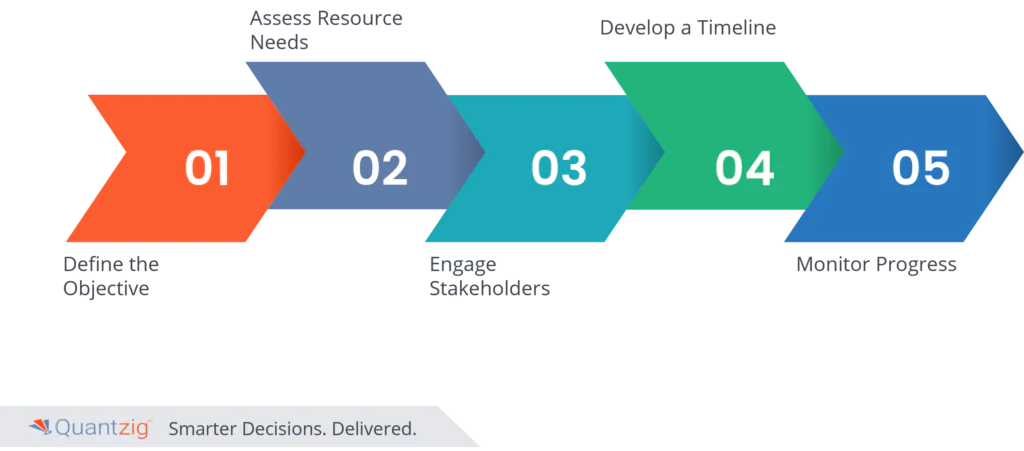Written By: Sudeshna Ghosh
Table of Contents
Key Takeaways of Campaign Planning
- An ecommerce client experienced a significant uplift in campaign performance, with response rates for targeted ROI maximization campaigns soaring by 22%.
- By implementing a comprehensive Customer 360 Datamart and leveraging advanced analytics, Quantzig enabled the ecommerce client to identify and target high-propensity customer segments effectively.
- The success story of our collaboration with the ecommerce client highlights the transformative power of data-driven solutions in revolutionizing customer engagement.
- Quantzig’s customer analytics 3.0 solutions empower businesses to drive revenue growth through personalized marketing strategies tailored to individual consumer behaviors across omni-channel platforms.
Introduction
Effective campaign planning is a cornerstone of successful customer acquisition and retention strategies, requiring in-depth attention to detail and a comprehensive understanding of target audiences. A well-executed campaign plan not only outlines clear objectives and messaging but also leverages data-driven insights to tailor engagements and maximize impact. By integrating innovative techniques and technologies, businesses can craft compelling campaigns that resonate with audiences, ultimately leading to increased customer acquisition and sustained growth. This case study highlights how Quantzig’s innovative Customer 360 Datamart and advanced analytics solution helped an ecommerce client to experience a significant uplift in campaign performance, with response rates for targeted ROI maximization campaigns soaring by 22%.
Book a demo to experience the meaningful insights we derive from data through our analytical tools and platform capabilities. Schedule a demo today!
Request a Free DemoQuantzig’s Success story
| Client Details | A leading player in the ecommerce sector based in the USA. |
| Challenges Faced by The Client | Our client struggled with suboptimal data management practices, and the absence of a robust system for identifying potential repeat customers. |
| Solutions Offered by Quantzig | By implementing a comprehensive Customer 360 Datamart and leveraging advanced analytics, Quantzig enabled the ecommerce client to identify and target high-propensity customer segments effectively. |
| Impact Delivered | A significant uplift in campaign performance, with response rates for targeted ROI maximization campaigns soaring by 22%. |
Client details
Our client, a leading player in the ecommerce sector, faced significant challenges in effectively managing their customer profiles and implementing personalized, contextualized actioning strategies. Specifically, their ecommerce team sought a solution to identify transactional customers with high propensities for repeat purchases.
Challenges faced by the client
Prior to engaging with Quantzig, our client struggled with suboptimal data management practices, hindering their ability to implement targeted strategies. The absence of a robust system for identifying potential repeat customers compounded their challenges, necessitating a comprehensive solution to streamline operations and enhance customer engagement and value proposition.
Solutions offered by Quantzig
Quantzig initiated the project by constructing a comprehensive Customer 360 Datamart, consolidating demographic, transactional, channel, and behavioral data to provide a holistic view of customer interactions. Leveraging advanced analytics, we identified key attributes influencing purchase behavior, enabling us to pinpoint customer profiles with higher propensities for repeat purchases. Subsequently, we devised activation plans tailored to both inner loop (website) and outer loop (campaigns) customer journeys to optimize engagement and conversions rates.
Impact Delivered

Our partnership with the client yielded significant outcomes, empowering them to identify and target key customer cohorts effectively. By systematically retargeting high-propensity customer profiles and value proposition, our client witnessed remarkable improvements in business performance, with response rates for ROI maximization campaigns soaring by 22%. This success underscores the transformative impact of Quantzig’s data-driven solutions in driving customer engagement, value proposition, and revenue growth for ecommerce businesses.
Quantzig’s tailored approach not only addressed our client’s immediate challenges but also laid the foundation for sustained success in a competitive ecommerce landscape.
What is a Marketing Campaign Planning?
Marketing campaigns are pivotal for businesses aiming to achieve organic sales growth and optimize marketing costs. A comprehensive campaign plan integrates data-driven strategies and competitive data analysis to ensure marketing ROI. By emphasizing conversion rate and CPA ratio, B2B organizations can fine-tune marketing tactics for digital marketing excellence. Auto-investments and enterprise revenue performance management strategies streamline resources for marketing optimization.
Amidst the global crypto market, understanding historical monthly averages and forecasting future marketing ROI is crucial. In this landscape, leveraging marketing analytics and marketing KPIs shapes effective marketing solutions tailored to specific audience segments across diverse customer journeys, social media platforms and promotional channels. A well-crafted plan, integrating advertising strategy and planning templates, delineates clear targets and activities, facilitating marketing strategy execution and enhancing return on investment.
What is the Importance of an Effective Campaign Planning to win more customers?
Customer-centricity is paramount for tech companies striving to maintain an edge in business operations. Recognizing that customers seek to be heard and understood, personalized experiences tailored to individual preferences have become a strategic imperative. This heightened emphasis on Customer Experience (CX) and personalization underscores the need for innovative approaches to engagement. Analytics emerges as a cornerstone in this endeavor, not only facilitating personalized next best actions but also enabling process optimization and automation to deliver these tailored experiences efficiently and at scale. Such endeavors transcend traditional methods, which are impractical for executing individualized strategies across a diverse customer base.
In essence, the convergence of customer expectations and technological capabilities underscores the pivotal role of analytics in enhancing CX and driving differentiation. By harnessing smart Insights, tech companies can unlock opportunities to forge deeper connections with customers while streamlining operations for sustainable growth and competitiveness.
Why Proper Planning is Crucial for the Best Marketing Campaigns?
- Strategic Decision Making: Utilizing data-driven strategies and competitive analysis, proper planning empowers businesses to make informed decisions regarding marketing strategy and tactics. By analyzing historical monthly averages and marketing costs, companies can devise effective marketing solutions tailored to their target audience and aligned with their marketing KPIs for optimal marketing optimization.
- Maximizing ROI: A well-structured marketing campaign plan facilitates efficient allocation of resources, including auto-investments and enterprise revenue performance management strategies, ensuring the highest return on investment possible. Through meticulous campaign planning processes, businesses can identify key promotional channels and social media platforms to engage their audience effectively, ultimately driving organic sales growth and achieving digital marketing excellence.
- Fulfill Business Objectives: Utilizing a comprehensive plan ensures alignment with marketing objectives, business goals, website landing pages, and promotional channels for effective digital marketing. Incorporating marketing analytics and marketing dashboards, businesses can monitor marketing performance, enhance corporate branding, make advertising strategy, analyze competitors, and adjust marketing tactics in real-time, optimizing marketing optimization and maximizing return on investment.
- Resource Optimization: A well-structured planning process facilitates clear communication and collaboration among marketing teams, stakeholders, and third-party suppliers. By employing tools like Collato’s AI-powered search and marketing toolkit, teams can streamline campaign execution, mitigate setbacks, and ensure timely campaign progress through transparent assignments and centralized overviews.
- Effective Targeting: Through meticulous audience segmentation and customer journey mapping, a well-orchestrated plan ensures precise targeting across various marketing channels, customer journeys, and social media platforms. Leveraging marketing analytics and digital marketing resources, businesses can identify lucrative market segments and tailor content marketing strategies for maximum customer engagement and leads generation.
- Streamlined Execution: By establishing clear campaign timelines and responsibilities using tools like Collato’s ready-made templates and project management software, teams can streamline campaign execution and minimize delays. Through regular progress check-ins and feedback, stakeholders can maintain transparency and ensure campaign success within allocated budget and resources.
What are the KPIs to Measure the Success of any Marketing Campaign?
Campaign planning is highly essential to implement an effective marketing strategy. Leveraging data-driven strategies and competitive analysis, it allows businesses to optimize marketing costs and ensure a favorable offline marketing ROI. By focusing on marketing optimization and marketing KPIs, companies can drive organic sales growth and maintain a competitive edge.
Moreover, integrating auto-investments and enterprise revenue performance management strategies enables efficient resource allocation for maximum impact. Considering the evolving global crypto market, analyzing historical monthly averages and future marketing ROI trends becomes imperative for informed decision-making. Through marketing analytics and campaign planning templates, businesses can tailor marketing solutions to resonate with their audience across various social media platforms, Website landing pages, and promotional channels, ultimately enhancing return on investment and ensuring the success of their integrated marketing campaigns.
Effective campaign planning isn’t just about setting business goals; it’s about devising actionable marketing tactics to achieve them. By understanding competitors and the dynamics of marketing channels, businesses can craft compelling advertising strategies to engage their target audience effectively. Clear targets and well-defined activities streamline planning processes, ensuring optimal utilization of resources, enhancing advertising or campaign strategy, corporate branding, and maximizing integrated marketing campaign impact. With a robust marketing plan in place, companies can navigate the complexities of the digital landscape with confidence, driving digital marketing excellence and ultimately winning more customers in the process.
Effective campaign planning is paramount for businesses aiming to attract and retain customers in today’s competitive landscape. By leveraging digital marketing updates and smart insights from digital marketing blogs and digital marketing resources, marketers can stay informed about emerging trends and consumer preferences, guiding their advertising or campaign strategy and ensuring relevance in their modes of delivery and medium selection. Developing a comprehensive editorial calendar, deadlines, and marketing project plan facilitates organized execution, optimizing resources and timelines to meet objectives. Moreover, analyzing sales data and monitoring competitors enables businesses to refine their strategies and differentiate themselves in the market. Through strategic campaign planning, businesses not only enhance customer acquisition but also foster career development opportunities by addressing urgently needed jobs within the organization, ultimately driving growth and success.
What size of Businesses Need Campaign Planning?
Campaign planning is indispensable for businesses of all sizes, ranging from startups to established enterprises, seeking to maximize their marketing impact and achieve sustainable growth. Regardless of the company’s scale, implementing a comprehensive marketing framework such as the RACE Framework and leveraging resources from reputable institutions like the Chartered Institute of Marketing are essential for strategic direction and alignment.
By developing an integrated media schedule and staying informed through platforms like smart Insights, businesses can ensure consistent messaging and targeted outreach across various channels and website landing pages, optimizing their marketing funnel and driving engagement. Furthermore, investing in marketing training and collaborating with a seasoned digital strategist equips businesses with the expertise to navigate the complexities of online marketing effectively. Leveraging data-driven advice and implementing marketing control mechanisms enable businesses to adapt and refine their campaigns based on real-time insights, ensuring optimal performance and sustained success in today’s dynamic marketplace.
Regardless of the business’s scale, having a well-defined digital marketing strategy is crucial for success in today’s competitive landscape. Access to resources such as a digital marketing resource library, digital marketing glossary, and digital marketing books provides valuable insights and knowledge to inform strategic decisions. Additionally, undertaking digital marketing courses and utilizing digital marketing templates and digital marketing guides offer practical tools and methodologies for campaign implementation. Collaborating with experts or leveraging a digital marketing toolkit enables businesses to translate strategy into action, driving tangible digital marketing results and ensuring optimal digital marketing implementation. With a proactive approach to digital marketing practice and continuous learning from digital marketing gurus, businesses can stay ahead of trends and anticipate the digital marketing future, positioning themselves for long-term success in the digital realm.
Campaign Planning: Essential Steps for Success
It is a systematic process that demands meticulous organization, strategic forethought, and seamless communication. To orchestrate a successful campaign, it’s imperative to navigate through various moving parts with clarity and precision. Here’s a breakdown of the fundamental steps to ensure your planning sets the stage for triumph well in advance of the launch.
Step 1: Define the Objective
Initiate your campaign planning process by meticulously defining the campaign’s objective. This pivotal step establishes the campaign’s direction, determining the scope and resource allocation needed for success. Whether it’s enhancing brand visibility or driving sales, clarity on the objective ensures alignment across stakeholders and informs subsequent strategic decisions. Involving key team members such as social media experts, brand managers, and content creators at this stage fosters a comprehensive understanding of the campaign’s purpose and sets the groundwork for strategic alignment.
Step 2: Assess Resource Needs
Thoroughly assess the resources required to execute your campaign strategy effectively. From creative assets like visuals and copy to technical requirements and platform-specific content, a comprehensive evaluation ensures all necessary elements are accounted for. Collaborating closely with the marketing team facilitates a detailed breakdown of resource needs for each phase of the campaign. This step lays the groundwork for efficient resource allocation, enabling teams to plan and execute campaigns with precision while optimizing resource utilization.
Step 3: Engage Stakeholders
Engage stakeholders across the organization, both internal and external, to ensure alignment and collaboration throughout the campaign planning process. Clear communication and detailed task assignments are essential to ensure everyone understands their roles and responsibilities. Utilizing a campaign planning template streamlines this process, providing a centralized platform for tracking progress and facilitating transparent communication. By involving stakeholders from the outset, you foster a sense of ownership and accountability, driving collaborative efforts towards achieving campaign objectives effectively and efficiently.
Step 4: Develop a Timeline
Craft a detailed timeline that outlines key milestones, deadlines, and checkpoints throughout the campaign lifecycle. Anticipate potential delays and setbacks by allocating sufficient time for each phase, including reviews, approvals, content marketing and production. Providing clear deadlines for external collaborators ensures alignment and enables effective coordination across teams. Utilizing project management tools or templates offers visibility into the campaign timeline, empowering teams to monitor progress and address any deviations promptly. A well-defined timeline serves as a roadmap for successful campaign execution, guiding teams towards achieving objectives within stipulated timeframes.
Step 5: Monitor Progress
Continuously monitor progress and track performance metrics throughout the campaign planning process. Regular check-ins and status updates allow teams to identify and address any issues or bottlenecks promptly. Utilizing project management tools or communication platforms facilitates real-time collaboration and ensures transparency across teams. By monitoring progress closely, teams can proactively address challenges, make necessary adjustments, utilize assets, and stay on track to meet campaign objectives. This iterative approach to monitoring progress enables teams to maintain momentum, optimize performance, and drive successful business outcomes.
How to Implement an Effective Campaign Planning?
Implementing an effective campaign planning is essential for businesses aiming to achieve their marketing objectives and drive success in today’s competitive landscape. By leveraging insights from Smart Insights and embracing diverse marketing channels such as digital marketing and content marketing, organizations can create impactful campaigns that resonate with their target audience. In this guide, we outline four key steps to execute a successful campaign planning process, integrating elements like customer profiles, value proposition, and integrated marketing campaigns to maximize results.
Step 1: Define Your Campaign Strategy Begin by outlining a clear campaign plan aligned with your business goals and objectives. Identify your target audience and develop customer profiles to understand their needs and preferences. Define your unique value proposition to differentiate your campaign from competitors and establish a compelling message that resonates with your audience. Consider factors such as promotional channels and website landing pages to effectively reach and engage your target market.
Step 2: Allocate Resources and Set Budget Next, allocate resources and set a realistic budget for your campaign. Consider the costs associated with various marketing activities, including advertising, content creation, and campaign management. Ensure that your budget aligns with your campaign objectives and allows for flexibility to adapt to changing market conditions. Collaborate with stakeholders and marketers to optimize resource allocation and maximize the impact of your campaign.
Step 3: Develop an Integrated Marketing Plan Create an integrated marketing campaign that leverages multiple channels to reach your audience at every stage of the customer journey. Utilize digital marketing strategies such as email marketing, social media, and search engine optimization to increase visibility and engagement. Coordinate your efforts across different channels to deliver a cohesive message and reinforce your branding and corporate identity.
Step 4: Monitor, Measure, and Optimize Finally, closely monitor the performance of your campaign and track key metrics such as conversions, audience engagement, and campaign objectives. Use analytics tools to gain insights into the effectiveness of your marketing efforts and identify areas for improvement. Adjust your strategy as needed based on audience feedback, market trends, and deadlines to ensure that your campaign continues to drive results and achieve your business goals.
Implementing an effective campaign planning process requires careful consideration of various factors, including audience targeting, resource allocation, and channel integration. By following these four steps and leveraging insights from Smart Insights and industry best practices, organizations can create impactful marketing campaigns that resonate with their target audience and drive business growth. With a strategic approach and a focus on continuous optimization, businesses can achieve success in today’s dynamic marketplace and secure increased customer acquisition.
Also Read: Marketing Attribution Modelling: Choosing the Right Model for Your Business
Experience the advantages firsthand by testing a customized complimentary pilot designed to address your specific requirements. Pilot studies are non-committal in nature.
Request a Free PilotWhat are the Possible Challenges While Implementing Effective Campaign Planning?
Marketing operations within tech industry is driven by activation, engagement and interactions across product lifecycle in a repeated loop and therefore makes it a different play book to other industries. Achieving synergy between customer-level intelligence and campaign-level activations is essential. A hybrid sensitized campaign strategy is required, delicately balancing personalized engagements with the risk of over communication across multiple concurrent campaigns. Seamlessly integrating these elements ensures a cohesive and effective marketing approach tailored to the unique demands of the tech industry.
Implementing effective campaign planning can encounter various challenges across different domains. From a socio-economic status perspective, understanding diverse consumer demographics and their purchasing behaviors poses a significant hurdle. In the realm of web content and online advertising, ensuring content relevance and engagement amidst digital noise can be daunting.
Additionally, coordinating OOH (out of home) advertising with online campaigns requires seamless integration across various media channels. Managing the campaign manager and ensuring smooth execution of creative media across websites demand meticulous attention to detail. Evaluating success and fostering reflection for continuous improvement resemble the complexity of a military operation or political campaign, necessitating a comprehensive guide and clear course of action. Adhering to defined processes and navigating the stages of action plan while aligning with expected results are crucial for achieving campaign objectives. Engaging designated stakeholders at every phase ensures alignment and collective effort towards campaign success.
How to Create Your Campaign Strategy?
To create an effective campaign strategy, start with a comprehensive situation analysis to understand the market landscape and customer behavior. Utilize a conversion-based campaign forecasting model to predict outcomes and set measurable objectives. Define the theme of your campaign and establish specific send dates and a detailed campaign calendar to ensure timely execution. Incorporate various elements such as event emails and align activities with your overall marketing calendar and campaign requirements. Prioritize quality assurance (QA) to maintain consistency and effectiveness throughout the campaign. Regularly track and analyze activity reports to assess performance and make necessary adjustments. Implement demand generation processes and follow best practices to maximize impact. Consider leveraging services like DemandGen’s Campaign Execution Services for expert support in executing your campaign strategy.
What are the key Benefits of Quantzig’s Innovative Campaign Planning and Analytics Solution?
Our cutting-edge customer analytics 3.0 solutions drive revenue growth by pinpointing and cultivating high-return consumer behaviors across omni-channel platforms. Leveraging Quantzig’s behavior and experience-based segmentation facilitates both inner and outer loop activations across paid, earned, and owned media channels throughout the customer journey. Our omni-channel mapping modules continuously gather consumer data, enhancing intelligence at every stage of the sales funnel. Fueled by AI, our comprehensive Next Best Action engines deliver personalized marketing and content recommendations tailored to each customer’s purchase intent and lifecycle stage, maximizing engagement and conversions opportunities and stand out from competitors.
Quantzig’s innovative Campaign Planning and Analytics Solution offers a plethora of benefits for B2B organizations seeking to streamline their marketing efforts and enhance overall efficiency. By leveraging an AI-powered search engine and advanced analytics, the solution provides valuable insights that empower teams to make data-driven decisions and optimize their marketing efforts. It fosters organization and forethought by centralizing communication and collaboration among various stakeholders, reducing project chaos and aligning moving parts towards a unified plan.
Moreover, it facilitates enhanced brand awareness and lead generation through targeted campaigns across multiple channels, orchestrated seamlessly by cross-functional teams including social media managers, content marketers, and PR specialists. The solution ensures clarity and accountability by defining responsibilities and due dates within a structured calendar, thereby expediting project execution and asset delivery. With features such as visuals and copy iteration, as well as streamlined approval processes, Quantzig’s solution empowers marketers to efficiently manage content completion and drive successful campaign outcomes while reducing reliance on cluttered tools and manual tracking methods.
6 Essential Parts of a Campaign Planning Template
- Crafting a successful integrated marketing campaign necessitates meticulous planning across several crucial stages, each addressing key issues imperative for campaign effectiveness.
- Initially, defining clear SMART goals and establishing robust tracking mechanisms is essential to ascertain achievement.
- Subsequently, honing in on campaign insights and precisely targeting the intended audience forms the bedrock of impactful messaging.
- Crafting compelling messages and offers tailored to resonate with the audience’s needs and preferences further solidifies campaign positioning.
- Determining the optimal media channels and budget allocation ensures efficient reach and influence, while meticulous asset production guarantees cohesive campaign execution.
- Lastly, thorough testing and ongoing adjustments throughout the campaign lifecycle are imperative to optimize performance and drive desired outcomes.
By methodically addressing these stages and associated considerations, businesses can develop and execute campaigns poised for success in today’s competitive landscape.
Get started with your complimentary trial today and delve into our platform without any obligations. Explore our wide range of customized, consumption driven analytical solutions services built across the analytical maturity levels.
Start your Free Trial TodayConclusion
In conclusion, executing an effective campaign planning strategy is essential for businesses looking to win more customers in today’s competitive landscape. By defining proper business goals, targeting the right audience, crafting compelling messages and offers, strategically planning media channels, customer journeys, and budget allocation, managing campaign assets effectively, enhancing corporate branding, and continuously testing and optimizing throughout the campaign lifecycle, B2B organizations can maximize their chances of success. Embracing data-driven insights, leveraging innovative techniques, and maintaining agility are also crucial elements in adapting to evolving market dynamics and customer preferences. Ultimately, a well-executed plan not only drives customer acquisition but also fosters brand loyalty and long-term growth opportunities.





